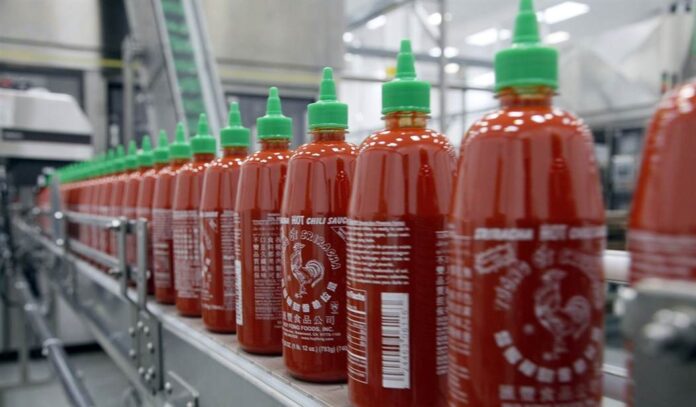It started out as a Southern California Vietnamese thing, but now Sriracha hot chili sauce has taken the world by storm. First sold in 1983, this amazing combination of fresh, red jalapeño chili peppers, vinegar, garlic, salt, and sugar is found in every Asian restaurant from Fountain Valley to Fremont, and in supermarkets, restaurants, and sauce shops in every state of the U.S. and the world.
The founder of Huy Fong Foods and Sriracha creator, David Tran arrived in California from Vietnam in 1979 and according to a fan site, set out on a mission to produce a spicy companion to his Pho soup.
He quickly set out on a mission to produce one to share with his Southeast Asian community of Los Angeles, which was also suffering a hot sauce drought. Within a few months, his first chili sauce “Pepper Saté Sauce” was born and Tran began selling it door to door to local restaurants and markets. He named his company “Huy Fong Foods” in remembrance of the old Panamanian freighter, the “Huey Fong”, which carried Tran out of Vietnam, and chose his zodiac animal, the rooster, as his logo.
The Gospel According to Sriracha
A unique and innovative product had now hit the market, and spread like the fire you feel on that first taste of Sriracha. Huy Fong Foods has never had to advertise its product. The legendary hot sauce spread like the Christian faith: from house to house, restaurant to restaurant, with the fire of the sauce igniting an entire movement. Part of the secret of the sauce is that all the jalapeños used in Huy Fong sauces were grown locally in So Cal. In fact, for 28 years, they came from one source: Underwood Farms in Camarillo, CA. Once the chili peppers are picked, they are processed less than a day after harvesting. The factory processes over 100 million pounds of peppers over the course of a 10-week harvest season. This is the source for the entire year of product sales.
Because of this rapid growth and quality of production, Huy Fong Foods is known as one of the world’s leaders in the hot sauce industry. The rapid growth forced Huy Fong Foods to move in 1986 from a tiny shop in Downtown L.A.’s Chinatown to a 68,000-square-foot building in Rosemead, California, in the San Gabriel Valley of Southern California. Production continued to increase annually, requiring another factory upgrade.
In 2010, Huy Fong Foods increased its square footage almost 10-fold when it moved into a 650,000-square-foot manufacturing facility in Irwindale, just 30 minutes east of the Rosemead location. Now, Irwindale is known for two things: the connection between the 605 and the 210 Freeways and Huy Fong Foods. Thanks to this expansion, the factory produces up to 20 million bottles a year.
Sriracha Apocalypse
This gastronomical phenomenon and economic powerhouse almost came to a standstill in 2014. In 2013, Irwindale residents lodged complaints that the spicy odor emitting from the factory caused headaches, heartburn, and watery eyesight. In April 2014, the Irwindale City Council declared the Huy Fong Foods factory a public nuisance, and demands were being made that the factory cease production. This led to court challenges and lawsuits between the city and Huy Fong Foods, which were ultimately dropped by both parties with some intervention from then-Governor Jerry Brown.
When the Spice Goes Out of a Relationship
As any person, product, or enterprise reaches epic levels of fame and renown, that’s when the inevitability and egos set in. What started out as a beautiful marriage between Huy Fong Foods and Underwood Farms ended in a bitter divorce.
The marriage over Sriracha was spicy. The divorce is bitter. And public.
Huy Fong Foods, the hot sauce giant built by Vietnamese refugee David Tran, has accused a Ventura County jalapeño farmer of terminating a nearly 30-year partnership without so much as a “Dear John” note.
In accusations on social media and a lawsuit moving to trial as soon as May in Ventura County Superior Court, it said the grower seized $7 million worth of equipment that is now being returned more than two years later.
Underwood Ranches, the Camarillo business that grew peppers for Tran since 1988, has fired back with accusations the Sriracha maker reneged on a contract, attempted to drastically cut pepper payments and left its partner no options except divorce. The ranch company’s leaders also charge Tran with unsuccessfully trying to lure away a longtime Underwood manager as part of a plot to use new growers and push out Underwood.
Underwood Ranches ended up winning a $23.3 million verdict
The award in Ventura County Superior Court includes $14.8 million to compensate two years of Underwood financial losses that the jury found were linked to the abrupt divorce before the 2017 growing season. About $1.5 million was deducted for an overpayment made by Huy Fong to Underwood. That leaves general damages of $13.3 million.
Underwood Ranches, which operated the largest jalapeño operation of its kind in the nation to meet rocketing demand for Huy Fong’s sauces, was also awarded $10 million in punitive damages.
That’s gotta burn like Sriracha down the throat. During the legal back and forth between 2017 and 2019, Huy Fong Foods had to contract with Mexican farmers for their supply of the chili peppers. So, they could no longer claim the local cache for the production of their hot sauce. More problems with supply arose when the global pandemic hit in 2020.
Pandemic-era supply chain shortages proved that people will go to extreme lengths ― like hoarding and paying exorbitant prices ― to score their favorite products when supplies are limited. And according to the Los Angeles Times, that’s exactly what some hot sauce lovers are doing.
The publication recently reported that a single 28-ounce bottle of Sriracha was selling for $29.99 at a local Asian grocery store and limited to two bottles per customer.
I failed to notice this particular supply shortage. Lucky for me, I still have a bottle in the pantry. But apparently, this shortage is upsetting the worldwide populace, to the point where people are lamenting on social media and stealing bottles from restaurants.
Seriously.
When I have kids they will be taught about the great sriracha war… never in my life did I think this beautiful sauce given to us by the gods would be so hard to acquire:( this time line sucks 🤕🙁 pic.twitter.com/hI6h2PSG7C
— PCL (@elcompaboo) June 28, 2023
It is apparently a thing, and Tran is blaming global warming on the chili pepper supply shortage.
News of the shortage first broke last summer when Huy Fong Foods announced that less-than-favorable weather conditions had resulted in a dwindling chili pepper supply. A year later, times still appear to be tough for the supplier.
According to the Times, some Sriracha fans have begun taking bottles from local restaurants, and one dining hot spot who had 300 bottles as of a year ago is now down to 100 due to the dwindling supply.
But remember that lawsuit between Huy Fong Foods and their former chili pepper supplier Underwood Farms? Underwood claims that Tran is gaslighting the industry, and the shortage of the chili pepper crop has little to do with production, weather, or the pandemic. It is his own self-inflicted wound.
Sriracha Wars
You can tell Underwood is feeling really bad about it.
The Ventura County farmer who once grew 2,000 acres of red jalapeños for the makers of a hugely popular Sriracha sauce that is now very difficult to find can’t help himself.
The production shortage that makes it hard for his onetime partner, David Tran’s Huy Fong Foods, to keep its green-tipped, rooster-stamped bottles of hot sauce on shelves makes Craig Underwood, 80, of Camarillo, smile.
“Anything that is adverse to David makes me happy,” he said.
Definitely, some Schadenfreude going on, but it’s totally on point. Tran nuked a working partnership because he became entitled and greedy. When you have little to no real competition, this is often what happens. Oligarch behavior is not limited to venture capitalists, bankers, and corporate CEOs.
For 28 years, Underwood Ranches grew jalapeños in Ventura and Kern counties for Tran, a Vietnamese immigrant who created Huy Fong Foods. The ranches became the nation’s leading red jalapeño producer as Tran’s Sriracha spawned a fanatical following.
Everything changed seven years ago. The partnership shattered in a bitter dispute that morphed into a public soap opera via a lawsuit from Huy Fong, a countersuit from Underwood and a trial that brought national attention.
Underwood Ranches ended up winning a $23.3 million verdict in Ventura County Superior Court when a civil jury ruled Huy Fong broke its contract with the rancher and committed fraud by withholding information. The verdict was upheld two years later in an expensive appeal that forced Underwood to borrow money.
He won the fight but still sees pepper red when people blame Huy Fong’s shortage on a drought in Mexico and climate change. He’s convinced that if his ranches were still growing peppers for Huy Fong Foods, there would be plenty of sauce for everyone.
“There’s a shortage because David broke the supply chain,” he said. “He cut us off and turned us loose.”
Smart businesspersons that Underwood and his wife Sara Jane are, they saw an opportunity and capitalized on it. Life gave them chili peppers, and they created their own Underwood Farms line of Sriracha and hot sauces from it. It was also a way to offset costs while waiting out the costly litigation and the appeal.
After its partnership with Huy Fong Foods exploded, Underwood Ranches started making its own Sriracha and several other sauces. Underwood said sales have risen as people struggle to find Huy Fong’s product.
The sauces are meant to boost a company that Underwood acknowledged was badly wounded by the end of the Huy Fong partnership. He said the financial jeopardy actually grew worse after the $23.3 million verdict. The company couldn’t start collecting the money until a ruling on the appeal.
The popular sriracha Huy Hong tastes a bit different, because they have a new supplier of chile peppers. Huy Fong sued Underwood Farms for $1 million claiming they were undererpaid! The farmer, Craig Underwood countersued and won $23.3 million! Now, he makes his own sriracha! pic.twitter.com/3dr7OUBOtl
— Oddities From The Wacky Factory (@TheWackyFactory) April 28, 2020
While not the linchpin of the Underwood Farms business, the hot sauces are earning their keep. Underwood stopped his large-scale farming of peppers because part of the settlement required the $7 million in equipment used in harvesting the crop to be returned to Huy Fong Foods. Underwood makes good money through his other crops: tomatoes, onions, herbs, potatoes, and other fruits and vegetables. Underwood also makes good money through his Underwood Family Farms arm, offering food stands, and “U-Pick-Em” farms and fields in Ventura and Kern counties.
Huy Fong Foods still dominates the market, but other companies including Underwood Farms are gaining traction in the Sriracha hot sauce market—in part, thanks to Huy Fong Foods’ supply woes. Underwood came after the Sriracha King, and he did not miss. Now that Huy Fong Foods has been damaged and its product has lost its singular zing, one of these other companies will build the better mouse trap that captures consumer’s taste buds, imagination, and ultimately their pocketbooks.




